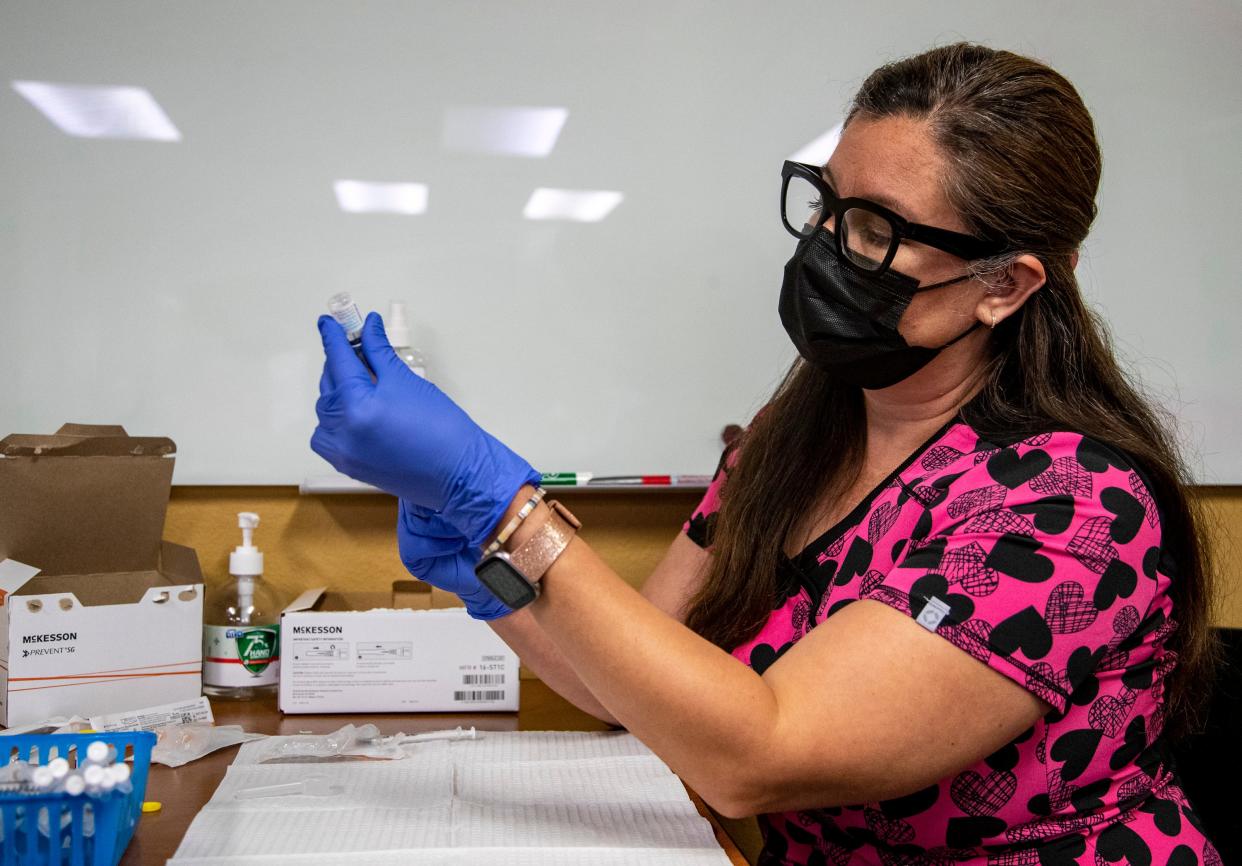Monkeypox cases fall in Riverside County, but many wonder how Pride will impact coming weeks

Riverside County has seen a significant decrease in the number of reported daily monkeypox cases over the last few weeks, which health officials believe is the result of increased vaccinations and changes in behaviors among high-risk individuals.
But the outbreak is still not over, and many wonder how upcoming Pride events in Palm Springs might impact the landscape.
Riverside County has had a 7-day average of one to two monkeypox cases per day in recent weeks, Deputy Public Health Officer Dr. Jennifer Chevinsky said during a recent virtual town hall meeting. That's a significant decrease from the months of July and August, when cases began to increase and the 7-day average during the height of the outbreak was around seven daily cases.
Local wastewater plants in Palm Springs and Indio have also seen low numbers. The Valley Sanitary District has reported 0 viral copies of the virus per gram of primary solids since Sept. 23. In Palm Springs, the most recent data available from Oct. 10 reported 30,588 viral copies per liter of wastewater, an increase from September data, but less than the peak in August.
The county's downward trend falls in line with data at the state and national level. California had a 7-day average peak of nearly 100 daily cases in August, and closed out the month of September with less than 20 daily cases.
"That's a big congratulations to the community and the partnerships we've had," Chevinsky said, adding that the decline was likely due to behaviors and increased vaccines available in recent months.
"We'll still be paying close attention and still be having additional events because we know that we're not out of the gate yet and know that we have a very large group of people coming in for the different Pride events," she added.
Monkeypox is a disease caused by the monkeypox virus. People usually become infected through close contact with skin lesions or bodily fluids of infected animals or humans (alive or dead), including droplets, or clothing and linens from an infected person. The virus can also be spread through sexual contact, but it is not classified as a sexually transmitted infection.
In Riverside County, there have been 304 confirmed and probable cases reported since the beginning of the outbreak. On a city-by-city basis, Palm Springs has had the most cases in the area with 144 as of Tuesday, followed by Cathedral City with 38.
Health officials say the Palm Springs area is at high risk given its large number of LGBTQ+ residents and tourists. The virus can infect anyone, but during the current U.S. outbreak, it has disproportionately affected men who have sex with men, a group that includes people who identify as gay, bisexual, transgender and nonbinary.
In terms of vaccinations, the county has received 9,009 vials and distributed 7,316 of them through its clinics and community partners.
Vaccine eligibility was limited to the most high-risk groups for months, which included those with a known exposure, sex workers and those whose occupations put them at high risk of potential exposure and infection. By the end of the September, the county expanded criteria to include "gay, same-gender loving or bisexual men, or any men, gender diverse or transgender people who have sex (including chemsex) with men or transgender people," broadening eligibility to a majority of people who filled out a vaccine interest form, Chevinsky previously told The Desert Sun.
That expansion has also opened up opportunities for open vaccination clinics to take place, which accept walk-ins, compared to the invite-only clinics that initially took place. Upcoming vaccine clinics can be viewed at https://www.rivcoph.org/mpx/Upcoming-Vaccine-Clinics.
Riverside County Public Health will also be administering vaccines at Palm Springs Leather Pride (Oct. 27-29) and Palm Springs Pride (Nov. 4-6), Chevinsky said, to "take advantage of having large groups of people together all at once."
But many say these efforts are too little, too late. The Jynneos vaccine consists of two doses taken one month apart. A person is considered fully vaccinated two weeks after their second shot. With one week left before Pride festivities begin, which attract thousands to the desert, those who have just received their first dose do not have ample protection against the virus.
Eric Johnson, vice president of the Palm Springs Leather Order of the Desert, said the organization has been working with the county to arrange a walk-in clinic on Oct. 29 during Palm Springs Leather Pride's Plunge Pool Party. He acknowledged that walk-in clinics are taking place frequently in the county, but noted that they were needed sooner.
"It’s been a race to get the shots available and completed in time for both Pride festivals, and (Palm Springs Leather Order of the Desert) has actively outreached to our members and followers in our social media platforms and direct outreach about clinics and urging people to get vaccinated (at least the first shot) as soon as possible," he said in an email.
When asked during the town hall meeting if the county is concerned about what could happen case-wise following Pride events, Chevinsky said past Pride events throughout the nation "haven't seen huge spikes yet at this point." But the county will continue to closely monitor data, hold vaccination events and reach communities with the highest risk of infection.
Ema Sasic covers entertainment and health in the Coachella Valley. Reach her at ema.sasic@desertsun.com or on Twitter @ema_sasic.
This article originally appeared on Palm Springs Desert Sun: Monkeypox cases fall in Riverside County, but will Pride change that?

